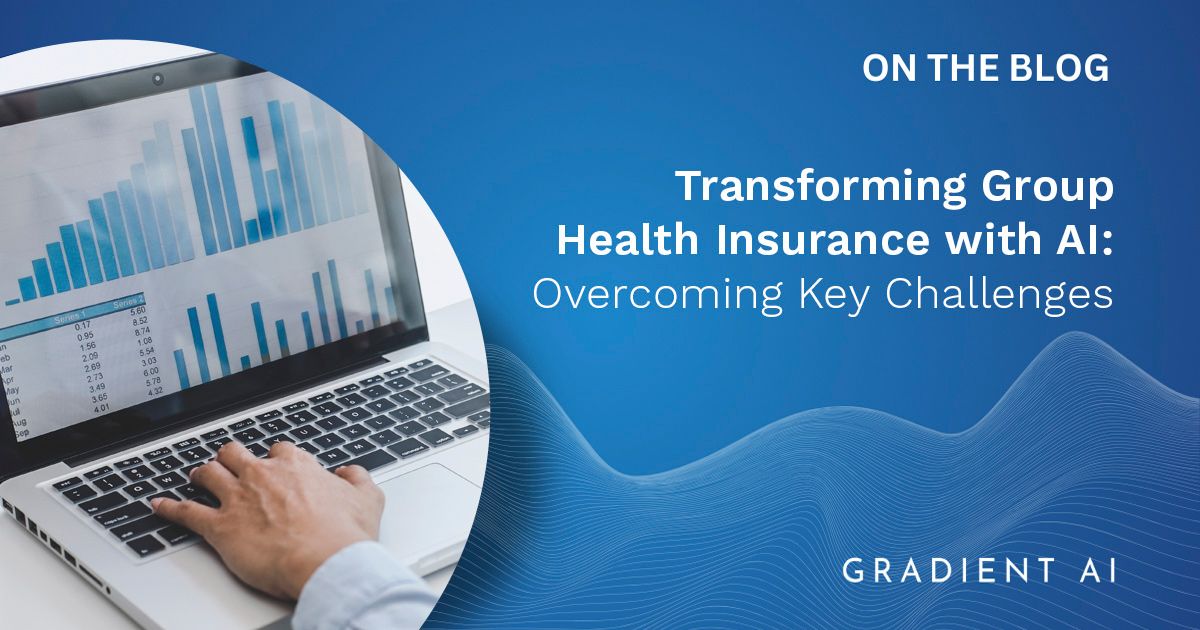Transforming Group Health Insurance with AI: Overcoming Key Challenges
Artificial Intelligence is revolutionizing operations and outcomes in the group health insurance sector, offering a pathway towards enhanced insight, robust risk management, and streamlined underwriting processes.
In our recent white paper, How Artificial Intelligence Addresses Five Key Challenges in Group Health Underwriting, we delve in detail into how AI mitigates and resolves five key challenges encountered by health insurers, empowering them to navigate complexities and foster more sustainable growth in a changing marketplace.
How Artificial Intelligence Addresses Five Key Challenges in Group Health Underwriting
Download the White Paper →
Key Challenges in Group Health Underwriting
Underwriters in the group health insurance industry play a crucial role in assessing and managing risk, ensuring the financial stability of insurance plans, and facilitating the provision of comprehensive coverage to diverse groups of individuals. However, the landscape of group health insurance presents increasing challenges that demand expertise and adaptability.
Here are 5 of the top challenges:
1. Inaccurate Risk Assessment
Traditional underwriting methods may fall short in accurately predicting risk, leading to either overpricing or underpricing of policies. This challenge underscores the critical need for more sophisticated risk assessment techniques that can leverage vast datasets and extract nuanced insights.
2. Underwriting Inefficiency
Timeliness and accuracy are paramount in the underwriting process, particularly during peak periods of policy issuance. The inefficiencies inherent in manual underwriting procedures can impede insurers' ability to meet market demands and capitalize quickly on opportunities.
3. Staff Turnover and Limitations
The aging workforce and the challenge of knowledge transfer pose significant obstacles to maintaining underwriting excellence. As experienced underwriters retire, there is a pressing need to capture and disseminate institutional knowledge to new team members efficiently.
4. Desire to Improve Outdated Methods
Legacy systems and traditional actuarial methods may no longer suffice in a rapidly changing landscape characterized by growing data volumes and shifting consumer preferences.
5. Plans to Expand into New Markets with Limited Data
Venturing into new markets presents inherent challenges, particularly when data availability is limited or nonexistent. Insurers must grapple with the complexities of assessing risk in unfamiliar territories while striving to maintain profitability and competitiveness.
AI’s Role in Addressing These Challenges
Enter artificial intelligence. AI offers invaluable insights, enhancing risk management, and streamlining underwriting operations. Health insurers who have integrated AI into their underwriting and risk management operations have found that AI enhances risk assessment accuracy by analyzing vast data sets and providing nuanced insights. Further, AI enables increased productivity, reduced turnaround times, and more accurate pricing.
In addition, AI can capture institutional knowledge - guiding new underwriters and automating processing where appropriate – enhancing overall efficiency.
“If there are ways to really provide better data, more accurate and quicker, that allow underwriters to become more financial decision makers rather than raters, that’s a huge change in how we are doing things.”
- Jay Sheehy, Chief Underwriting Officer, Gravie
Artificial Intelligence stands as a transformative force within the group health insurance industry, offering a multifaceted solution to top challenges faced by insurers. As more and more insurers embrace AI as a catalyst for change, they position themselves for sustained growth, competitiveness, and relevance in an increasingly dynamic landscape.
Learn More
For an in-depth look into how AI mitigates the five challenges outlined above, download our recent white paper, How Artificial Intelligence Addresses Five Key Challenges in Group Health Underwriting.


